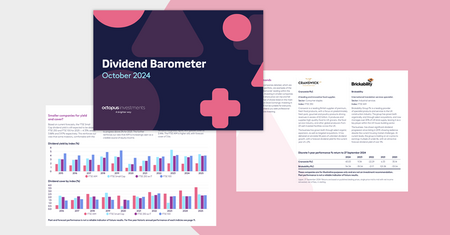When it comes to the world of venture capital, a worsening economy is something of a double-edged sword. Whilst challenging conditions place a strain on all businesses, windows of opportunity form for entrepreneurs and investors.
Despite uncertainty looking to continue throughout 2023, the saying ‘every cloud has a silver lining’ rings true for venture capitalists in the current landscape.
In fact, we think now might just be the best time to launch a business in the last decade.
This might surprise you but, just like diamonds, billion-dollar companies, or ‘unicorns’ are renowned for taking shape under pressure. Some of the most successful VC-backed businesses in Europe, like AirBnB and Uber, were formed in the wake of the 2008 global financial crisis. Including some of the unicorns originally invested in by Octopus Ventures, such as Zoopla.
So what’s going on here? Why can downturns create unicorns?
Let’s break down why these are favourable conditions for building successful new businesses, and how investors can access venture capital.
What are the opportunities in the current economy?
In the last few years, hiring and retaining talent has been extremely difficult. Since the pandemic, there has been huge demand for talent in technology roles. Big companies were onboarding thousands of people, leaving start-ups scrabbling for developers.
Now in a tougher economic environment, a string of large tech companies are making mass redundancies. Meta has announced its first mass layoff in the company’s history, planning to make 13% of its global workforce redundant.1 Amazon have also had their largest round of layoffs to date, with Microsoft and many others joining them.2
But what does this have to do with venture capital?
Although rising unemployment is of course unfortunate, for start-ups there’s a flip side. It means there’s a growing pool of talent that didn’t previously exist. And we know that in any economic condition, talent is key to building a successful business.
The second opportunity that economic hardship presents, is funding scarcity. There’s less capital available in the market and less start-ups raising money. But start-ups that do successfully raise money will be building their business in an environment where there’s less competition than would have existed in an economic boom. They will have less competition from day one, so the probability of success increases. Larger companies will often cut investment in innovation during a recession, and this could create windows of opportunity for new start-ups. For these reasons, it’s possible to invest in some early-stage businesses with enormous potential when the global outlook is shifting and challenging.
How Octopus Ventures is trying to unearth the next unicorn
The Octopus Ventures team believe that now is the best time to build a new tech-enabled business in over a decade, and therefore the best time to invest in these companies.
Now let’s be clear. As is always the case with venture capital, many businesses will struggle and fail. Not every early-stage company invested in will be a success. That’s why venture capital is a high-risk investment.
But the thing to remember with venture capital, is that it’s typical for the majority of returns to be driven by a small number of great successes. A high percentage of start-ups fail, regardless of economic conditions. But early-stage companies have high growth potential meaning that successes from a subset of the portfolio, can disproportionately drive returns. And for these reasons we should be extremely excited that the conditions over the coming years look ideal for spotting and investing in companies that can become household names.
Octopus Ventures has become one of the largest and most active venture capital firms in Europe.3 And we’ve backed some of the UK’s generation-defining companies, some of which have become unicorns; Depop, Zoopla and ManyPets.
To create and build unicorns we need to see great founders in the first place, so we meet with hundreds of businesses a year.4 We’ve also learnt along the way that the very best founders will seek a partner that fits their needs. So to attract exceptional investment opportunities, the Octopus Ventures team is divided into five specialist sectors; consumer, health, fintech, deeptech and B2B software.
Sector expertise puts us in a strong position against the competition and helps us diligently nurture every business on their growth journey. We’re excited about the new wave of talent availability because we place a lot of significance on this area of development within the start-ups we invest in. We have a dedicated people and talent function that ensures we surround the extraordinary founders we invest in, with the right people and skillsets to grow their business. But please remember that venture investing is high risk and isn’t suitable for everyone. Investors could lose all their money.
How to invest in venture capital
Venture capital investing can feel difficult to access. But at Octopus we provide investors with the ability to invest in venture capital through two types of investments.
A Venture Capital Trust (VCT) is an investment opportunity structured as a company, that’s listed on the London Stock Exchange. It uses investors’ money to buy shares in small, early-stage and unlisted companies. As smaller companies can struggle in their early years and many will not be successful, investors can claim 30% income tax relief to help compensate for the risk they take with their money. VCTs will also look to pay growth out to investors regularly by way of dividend, which is tax free, subject to qualifying conditions.
Octopus is the largest manager of Venture Capital Trusts. Our technology focused VCT, Octopus Titan VCT, is the largest VCT in the UK5 , with over 120 portfolio companies and £1.2 billion of funds under management. 6
The other route for accessing venture capital is through the Enterprise Investment Scheme (EIS). It’s also a government incentive designed to target investment into the same types of companies and investors can claim 30% income tax relief. With an EIS, investors own shares directly in a smaller portfolio of around 10-15 early-stage companies. This concentration compared to a VCT means if an individual company succeeds, investors can really feel the impact of the growth. Equally, any losses will be felt more sharply. Investors benefit from being able to claim loss relief on companies that fail, and from capital gains tax free growth on those that succeed, subject to qualifying conditions.
Important information about the risks
Investing in early-stage companies is considered high risk. The value of an investment, and any income from it, can fall as well as rise, and investors may lose all their invested capital.
VCT and smaller company shares could fall or rise in value more than other shares listed on the main market of the London Stock Exchange. They may also be harder to sell.
The tax reliefs detailed above depend on VCTs maintaining their qualifying status or portfolio companies maintaining their EIS-qualifying status.
Tax treatment depends on individual circumstances and could change in the future.
VCTs and EIS investments aren’t suitable for everyone. We recommend seeking financial advice before making any investment decision.
Where to find out more
If you’re interested in learning more about VCT or EIS investments, you can find all the information you need on our website.
Enterprise Investment Scheme >>
This advertisement is not a prospectus. Investors should only subscribe for VCT shares based on information in the prospectus and Key Information Document (KID), which can be found on the product pages of this website.
1 Big Tech Layoffs in Europe: A Violation of EU Policy?
2 Here’s a rundown of tech companies that have announced layoffs in 2022
3 2021 Annual Interactive Global League Tables, PitchBook, 4 March 2022
4 How one of Europe’s best known venture capital teams selects its opportunities
5 Association of Investment Companies, January 2022







